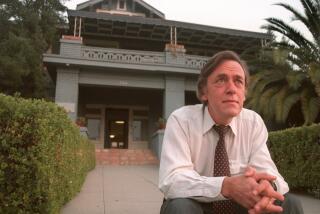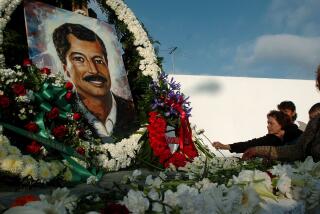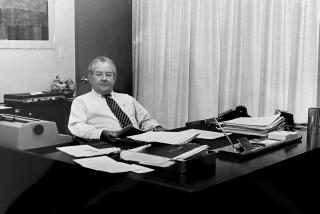Mario Obledo dies at 78; California secretary of health and welfare, Latino civil rights leader
Mario Obledo, who grew up on welfare and later ran the California agency that administered it when he became the state’s highest-ranking Mexican American official, died Wednesday in Sacramento. He was 78.
The cause was a heart attack, said his wife, Keda Alcala-Obledo.
Obledo was appointed secretary of health and welfare in 1975 by Gov. Jerry Brown and served until 1982, when he made an unsuccessful run for the Democratic gubernatorial nomination. He helped found a number of civil rights organizations, including the Mexican American Legal Defense and Educational Fund and the California Coalition of Hispanic Organizations. He also directed the League of United Latin American Citizens as national president in the 1980s.
In 1998 he was awarded the Presidential Medal of Freedom, the nation’s highest civilian honor, by President Clinton in recognition of his community work.
“Mario earned every award he was given, and then some. I will miss him,” Brown, the state attorney general who is running again for governor, said in a blog post Friday. He praised Obledo as a voice for justice who “dedicated his life to helping people and empowering the powerless.”
As health and welfare secretary, Obledo oversaw a massive state bureaucracy that controlled welfare, prisons, healthcare, unemployment checks and rehabilitation. He often said his most important contribution was encouraging Latinos to be politically active and serve the public, particularly in state government.
He generated controversy in 1979 when he used state stationery to lobby for a Latino bishop for Sacramento’s Catholic diocese. He also came under attack when a Reader’s Digest article in 1978 claimed that Obledo had ties to the Mexican Mafia, but the Brown administration found no evidence to support the allegations.
Born on April 9, 1932, in San Antonio, he was one of 12 children of Mexican immigrant parents. His father died when he was 5, exacerbating the family’s struggles. Some of his brothers were involved in gangs and wound up in prison or died in public hospitals. Although Obledo said he also associated with gang members in his youth, he said he “never got caught” and was fortunate to have adults who encouraged him to stay in school.
“I am not a self-made person by a large measure,” he told The Times in 1975. “People have helped me and encouraged me. People have been kind to me.”
He graduated from the University of Texas at Austin with a degree in pharmacy in 1957 and earned a law degree from St. Mary’s University in San Antonio in 1960.
He served three years as an assistant attorney general in Texas until 1968, when he joined other lawyers and activists to found the Mexican American Legal Defense and Educational Fund in San Antonio. He later became the group’s general counsel and president.
He was teaching at Harvard Law School in 1974 when Gov.-elect Brown asked him to help recruit potential cabinet officers. After two meetings, Brown, who had pledged to appoint minorities to his administration, decided that Obledo should join his cabinet as health and welfare secretary.
In 1982 Obledo resigned his post to run against Los Angeles Mayor Tom Bradley and state Sen. John Garamendi for the Democratic nomination for governor. He pledged to raise $1 each from 1 million voters, but his war chest fell far short of that goal, and he finished the primary a distant third.
He dropped out of the limelight for several years, reemerging in 1998 when two issues stoked his anger to the point that he felt he had to take action, even though he was 66 and had diabetes and back problems. He threatened to “deface or burn” a billboard in the Riverside County town of Blythe, near the Arizona border, that called California the “Illegal Immigrant State.” The sign was eventually removed. He also called for a boycott of Taco Bell for commercials featuring a Spanish-speaking Chihuahua that he said was offensive to Latinos, but the fast-food chain continued the campaign for two more years.
In addition to his wife, Obledo is survived by three children from a previous marriage and several grandchildren.
elaine.woo@latimes.com
More to Read
Start your day right
Sign up for Essential California for the L.A. Times biggest news, features and recommendations in your inbox six days a week.
You may occasionally receive promotional content from the Los Angeles Times.







